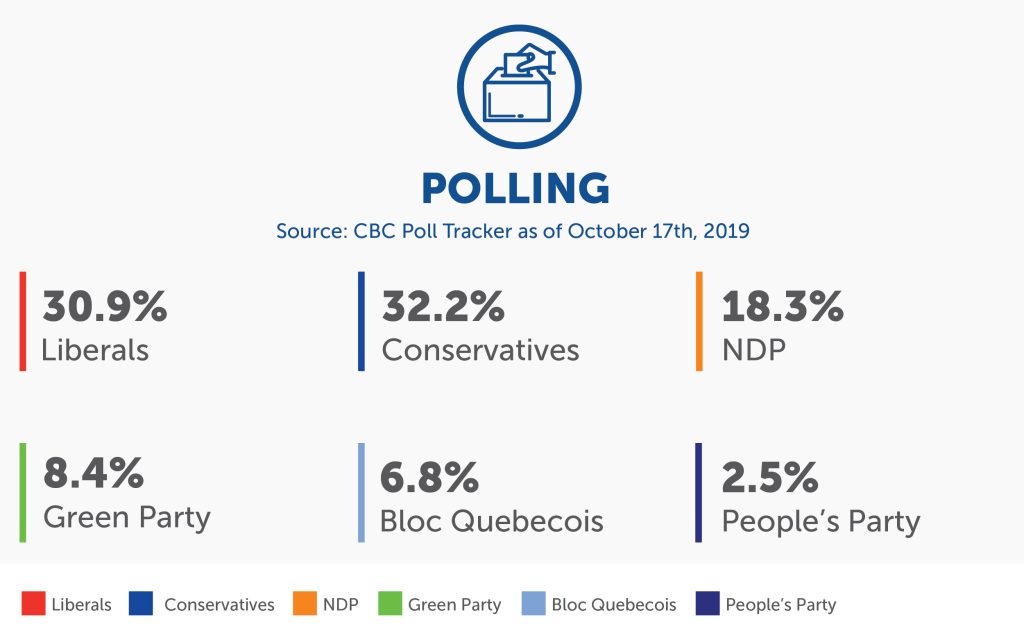Canadian Election Week 5: ‘Destination Gridlock’

As the electoral finish line approaches on Monday, the picture is anything but clear. The debates are done, the platforms have been rolled out, and the attacks have been launched. After spending millions reaching potential voters, the Conservatives and Liberals remain essentially tied in popular support, and which party will win the most seats remains an open question.
Recently, the New Democrats have seen a rise in their polling numbers, owing to strong debate performances and the social media presence of their Leader, Jagmeet Singh. The NDP and BQ surge has eaten into support for both the Conservatives and Liberals but, due to vote splits on the centre-left, these splits appear to favour the Conservatives.
At this point, it is likely that no party will win enough seats to form a majority government. In a minority government scenario, if the Prime Minister does not win the most seats but does not “concede” to the leader of the party that has won the most seats, it is up to the Governor General to ask the Prime Minister if they can form a government. In a minority scenario, to command the “confidence” of the House and not be defeated at the first possible opportunity via a confidence motion in the House of Commons, a new government would require the support of a majority of the seats in the House.
While it is possible for the second-place party to form a minority government without a formal coalition (such as currently in BC and NB), the shift in public opinion has led to speculation that a coalition government could arise. However, formal coalition governments in Canada are highly unusual. The last coalition government was formed by Conservative Prime Minister Robert Borden in 1917 during wartime over the issue of conscription. Hence, Conservative Leader Andrew Scheer is using language about a coalition government being out of step with “modern political convention.”
The nature of Prime Minister Trudeau’s conversation with the Governor General will depend on what happens on Monday. If the Liberals win fewer seats than the Conservatives but could form a minority government or a coalition with the NDP (and Greens?), then Trudeau will remain Prime Minister.
With such a tight race between the Liberals and the Conservatives and support rising for the NDP and BQ, the outcome of this election is anything but certain.

Liberals
The Liberals have shifted their narrative this week from seeking a majority government to holding on to a minority. On Wednesday, Trudeau said that a Conservative government is a possibility. This is no longer the election campaign of a confident front-runner but a campaign that is focused on bringing lost progressives back into the Liberal fold.
There is a reason to be optimistic for the Liberal fortunes of retaining a minority. Fear campaigns against the Conservatives have worked in the past: in 2004, the Liberals kept a surging Harper out of the Prime Minister’s office and arguably held the Conservatives to a minority both in 2006 and 2008. If the Liberals win the most seats but fall short of a majority, one option will be for them to find support from the other parties on an issue-by-issue basis. Prime Minister Harper achieved this support during his minority governments in 2006 and 2008. A minority government can last between 18 and 24 months as support can often be found around key issues and the need to stave off the immediate threat of another election campaign which requires electoral support and the financing to run a national election campaign.
While the hope for a majority government seems to be fading quickly, Prime Minister Trudeau still has a good chance of keeping his job

Conservatives
As the campaigns head into the final few days, the Conservatives believe that they have momentum on their side. Buoyed by strong advance poll turnout, an increase in the NDP vote share, and Jagmeet Singh’s statement (now retracted) that he would be open to a coalition with Justin Trudeau, the Conservatives believe there is a path to forming either a minority or majority government
The Conservative strategy is to motivate voters who are driven by affordability issues and concerned by a big-spending Liberal/NDP coalition government, potentially propped up by the Bloc Quebecois, to vote Conservative.
One challenge that Scheer and other parties face in Quebec, is the rise of the BQ and the erosion of their vote since the TVA French debate. Expect Scheer to spend the last few days trying to shore up votes in Quebec, the 905-region surrounding Toronto, and parts of British Columbia before he and the Conservative campaign end their tour in Scheer’s home riding of Regina-Qu’Appelle on Monday night.
The Conservatives have also historically benefited from a relatively strong ground game that can help boost turnout at the polls. A strong ground game also means that volunteers will be dropped into close-race ridings in order to get out the vote.

New Democrats
Jagmeet Singh and the NDP continue to see their polling numbers climb and their crowd sizes grow. This momentum has defied many pundits’ expectations, as just months ago, rumors swirled around Singh’s future as leader of the party. Singh’s skill as a retail politician, his air of authenticity, and his ambitious policy proposals have drawn progressives to the NDP tent. While the party will likely lose many of its seats in Quebec, Singh’s national popularity has left him contemplating the NDP’s role in a potential coalition government.
Singh has rejected the possibility of supporting a Conservative government and, through several statements, has left the door open to supporting the Liberals. This public speculation is strategic. In ruling out backing Scheer, the NDP is in effect assuring progressives that their vote will not lead to a Scheer government. NDP voters might also be inclined to believe that an NDP-Liberal coalition government might keep Trudeau accountable to commitments on climate, while guarding against decision-making that favours the wealthy and well-connected.
But in a minority government scenario, none of this is certain. Negotiations between parties can dissolve, other unexpected partnerships can be reached, and many voters know this. In the dying days of the campaign, it is still difficult to determine whether Canadian progressives will choose to vote for the NDP or against Andrew Scheer.

Greens
Elizabeth May and her Green Party have had a rough final stretch in this election. While the NDP rise has come mostly at the expense of the Liberals and Conservatives, the Green bastion on Vancouver Island remains strong. If the Greens move to four seats in Parliament, they will come at the expense of the southern Island NDP incumbents. However, the recent uptick in support for Singh has pushed some assumed BC gains for the Greens back into the “maybe” category.
With most seat projections predicting no outright majority for any party, even with a handful of seats, the Greens could still be an important player. However, the same projections show that when combined with their most likely minority government partners (the NDP and Liberals), they may still be one or two seats shy of being able to form a combined majority of seats in the House of Commons. If this is the case, we may see the power-broker role rest with the Bloc, who may be willing to deal on a case-by-case basis on issues with either a Liberal or Conservative minority government.

Bloc Québécois
All four major party leaders campaigned throughout Quebec on Wednesday, highlighting the growing importance of the province’s 78 seats in deciding which party will form a government. An insurgent Bloc, however, has completely changed the province’s federal political landscape.
Owing in large part to Bloc leader Yves-Francois Blanchet’s impressive performance in all three election debates, the party feels it has momentum on its side. The Liberal hopes for a majority were ultimately dashed by these performances, as the Liberals were relying on Quebec to hold on to a majority government. The only question outstanding is the precise seat count and whether the Bloc could hold the balance of power in a minority parliament. Blanchet was an unknown in Ottawa prior to this election campaign. We expect that he and his party will receive far more attention following Monday’s election.

People’s Party
For Maxime Bernier and the People’s Party, the campaign comes to an end more with a whimper than a bang. Immediately after the last debate, Bernier announced he was decamping to his home riding of Beauce, Quebec, to try to hold onto his seat.
The only other role the PPC will play on Monday night is the role of “spoiler.” In tight races, the PPC could split the vote in a handful of ridings where the vote differential between two front-runners is less than 500 votes. In an election where every vote counts, Bernier may starve his former Conservative leadership contender of the few crucial votes needed to win a few crucial seats.
